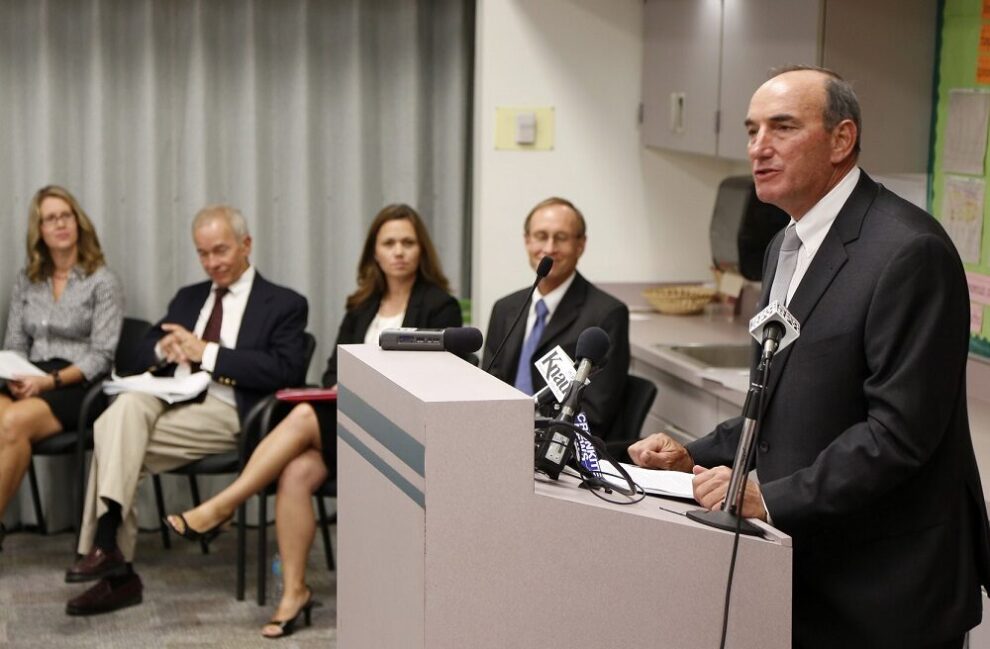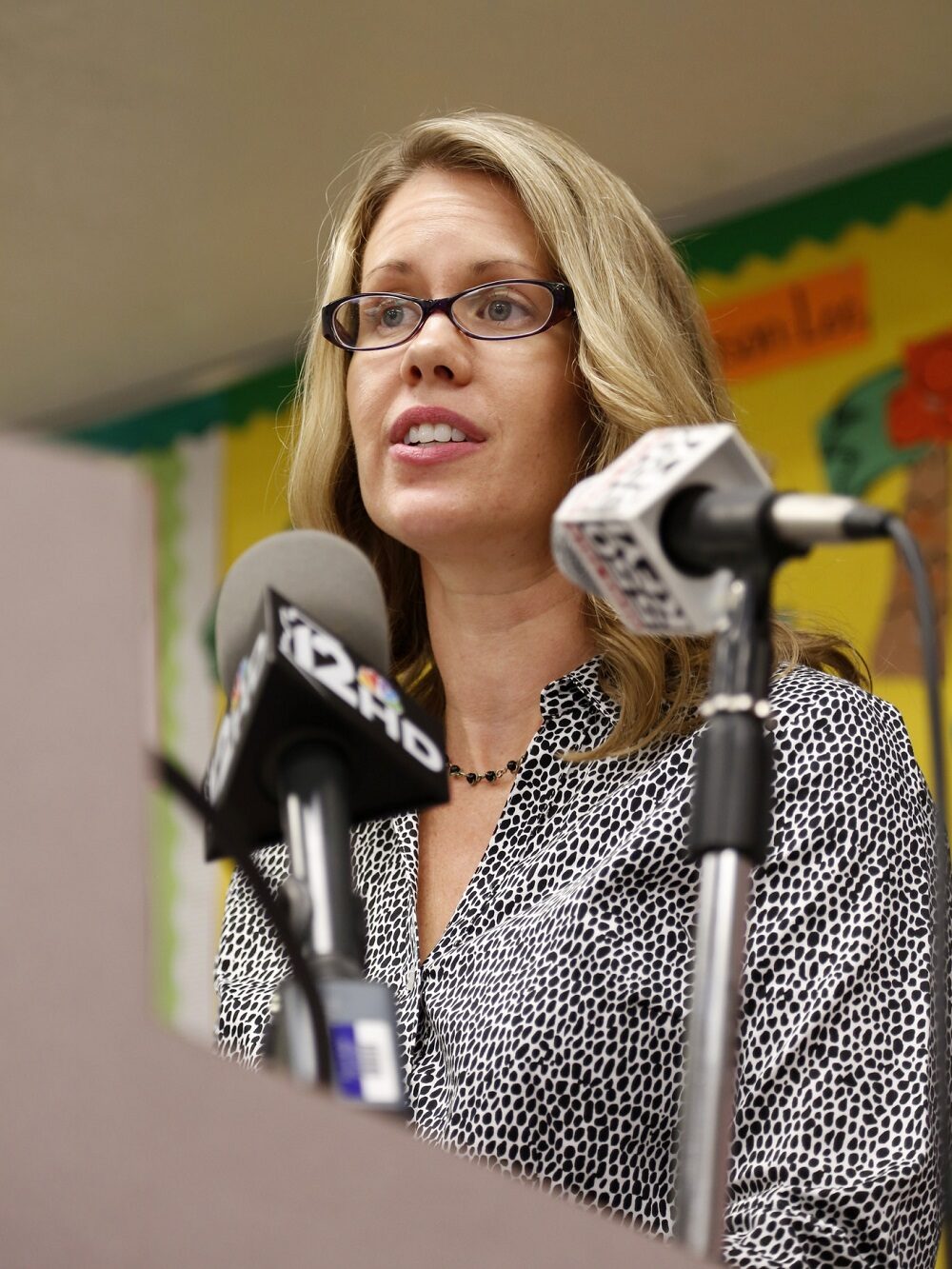A year after the Arizona Supreme Court decided the Legislature did not fund schools’ inflation costs for several years as it is legally required to, educators and parents came together to urge the state to start paying the more than $300 million owed to public schools this school year.
“I see the impact every day in our learning community in my children’s school. Parents are doing more. Teachers are doing more,” said Jen Darland, parent of a third-grader and a fifth-grader who attend a Tucson Unified school. “They are doing more to provide the learning environment our kids need in order to reach their full potential, but they’re doing it at a time and in an environment where they do not have the resources to help these children fully reach their potential.”
Balsz Elementary School District Superintendent Jeff Smith describes the cuts the district made in response to decreased state funding. Photos by Mike Barcia/AZEdNews
Like all Arizona districts, Balsz School District in Phoenix, was forced to cut a million dollars from its budget starting in the 2009-2010 school year due to decreased state funding during the Great Recession, said Superintendent Dr. Jeff Smith.
“Without the funding we’ve been forced to reduce salaries, benefits and essential services each year for the past five years in our district,” Smith said. “We had to make, I would say, ‘Sophie’s Choice’ kind of decisions. Do we clean classrooms or do we give teachers benefits? Do we have another aide who’s needed in this classroom or not?”
Balsz, like other Arizona districts, has tried to keep the cuts as far away from the classroom as possible, but inevitably the cuts do touch the classroom, Smith said.
“Everything from maintenance for buildings, afterschool programs, and enrichment for kids have all been on the chopping block in one form or another,” Smith said. “Either you squeeze it down and make it to where it’s not as effective or eliminate it.”
Arizona’s 2014 Teacher of the Year Beth Maloney talks about how the cuts have affected teachers. Photo by Mike Barcia/AZEdNews
If the Arizona Legislature had fully funded inflation costs, “Balsz would have received approximately $785,000 in additional funding for this year alone,” Smith said.
“This money would have gone to purchase textbooks, additional library books, and hire teachers to reduce class sizes for our students in Balsz,” Smith said.
Students currently in first through fifth grades have never learned in a classroom funded the way voters intended when they passed Proposition 301 in 2000, with basic annual increases to account for the rising costs of goods and services, Dr. Tim Ogle, executive director of the Arizona School Boards Association.
“If you look at this from a statewide perspective, that’s half a million students who have never had a fully funded education experience in our state,” Smith said.
Teacher salaries that haven’t risen in years have made it hard to retain highly-effective, experienced teachers and left hundreds of teaching positions unfilled across the state this year, said Dr. Frank Davidson, superintendent of Casa Grande Elementary School District.
‘The most significant issue for our district – without a doubt – is the impact the loss of inflation funding has had on our ability to be able to attract and retain teachers,” Davidson said.
“If I sent a recruiter back to Pennsylvania or Illinois and they’re sitting beside recruiters from Texas, or North Carolina, or Florida, or California and our salaries are substantially less than those other states, what’s a new teacher to do but to choose where they’re going to make the most money straight out of college,” Davidson said.
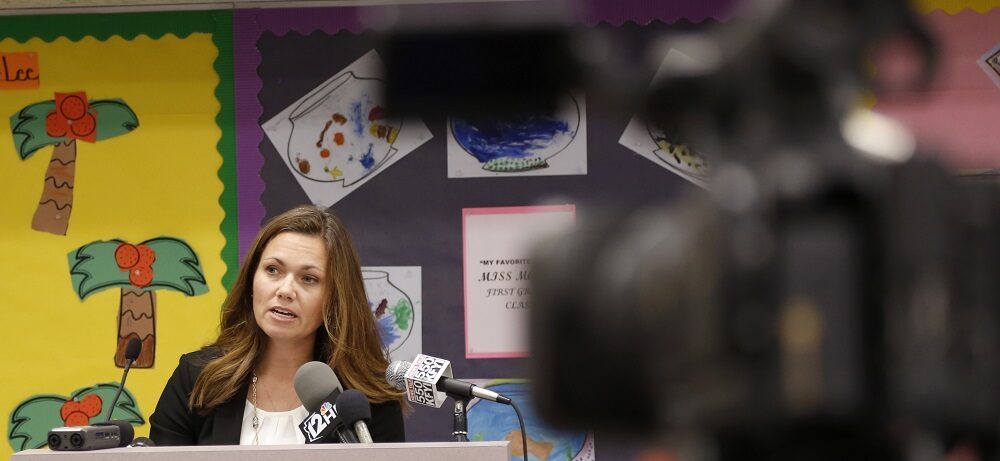
Jen Darland, parent of a third-grader and a fifth-grader who attend a Tucson Unified school, says parents and teachers are doing more to help students with less resources since the cuts. Photo by Mike Barcia/AZEdNews
One Tucson Unified middle school still has 15 teaching positions open this school year and two teachers there are expected to leave at the end of the month, Darland said.
Good teachers are leaving for other careers where they can make more money and going to other states where salaries are more competitive, Davidson said.
“In the past few years, I’ve watched colleagues – good teachers that I wanted my daughter to have as her teachers – leave Arizona or leave our profession entirely,” said Beth Maloney, Arizona’s 2014 Teacher of the Year.
“They’ve left the state after realizing that opportunities from state to state are vastly unequal,” Maloney said. “They left the profession because of the excessive burdens that funding cuts have placed upon teachers and have experienced burnout from all the additional responsibilities. Many have left the profession, because they could not raise a family after year of cuts in our pay.”
Maloney teaches a fifth-grade class of 30 students at Sunset Hills Elementary School in Dysart Unified School District.
“Our class sizes are so large that effective teaching is compromised,” Maloney said. “When I speak to my colleagues across the country they are often horrified when I tell them how many students we have in our classrooms in Arizona.”
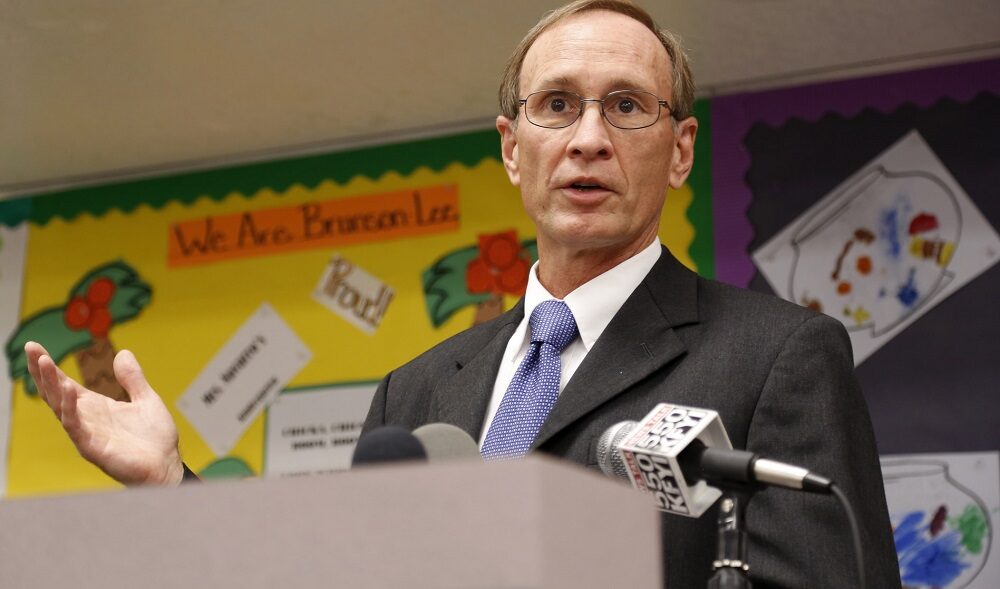
Casa Grande Elementary School District Superintendent Frank Davidson says the cuts have made attracting and retaining teachers difficult. Photo by Mike Barcia/AZEdNews
Fewer resources also mean that teachers have taken on many additional responsibilities, Maloney said.
“Classroom teachers are now not only instructional and content experts but we are also fulfilling the roles of counselors, secretaries, specialists in multiple world languages, parent and child advocates, college and career advisors, assessment coordinators, media and technology specialists, nurses, tutors, events coordinators, and curriculum writers and specialists,” Maloney said.
After plaintiffs in the Cave Creek Unified School District v. Ducey inflation funding lawsuit won at the Supreme Court of Arizona last September, the case was sent back to the Superior Court of Maricopa County to determine the reset level and backpay issues, said Don Peters, lead counsel for the plaintiffs.
“The plaintiffs argued that the Legislature was prepared to grant an increase, but starting with the base of what the base level had been when they quit making increases years ago,” Peters said. “We said, wait a minute, no. You should give the increase from what the base level would be today if you had made the increases every year the way you were required to by law.”
Plaintiffs wanted that reset base level corrected going forward which will affect what school districts get in the future, Peters said.
“There were years when school districts didn’t get that money. We said the voters wanted them to have that money, they need that money, the courts should order that it (the backpay) be disbursed,” Peters said.
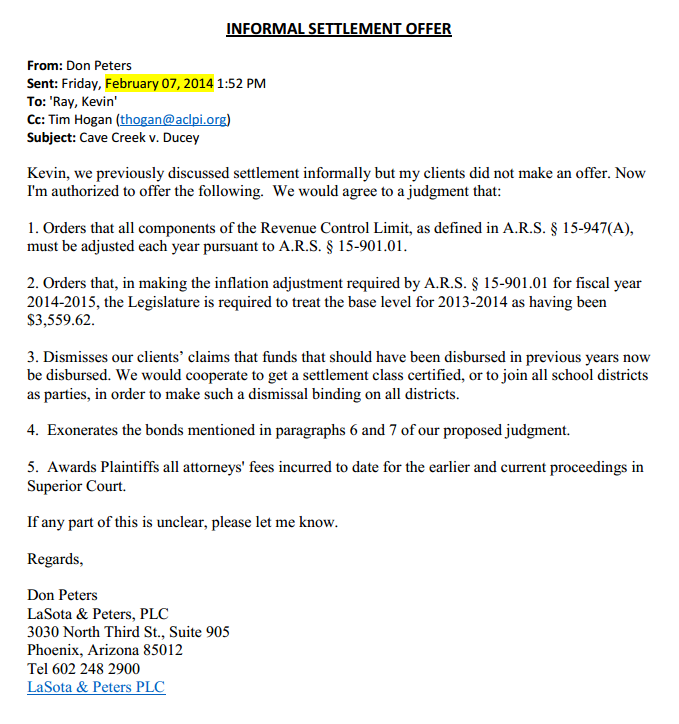
In February 2014, the plaintiffs offered a settlement proposal to the state, and in July 2014 the plaintiffs served an offer of judgment, which would have brought the litigation to a conclusion if the state had agreed, Peters said.
“If they (the State) would correct the base level going forward – the reset issue – the plaintiffs were prepared to give up the claim to money from past years – the backpay issue,” Peters said. “We have never had a response to the settlement overtures that we’ve made, but I do think it’s important for you to know that the schools have been trying to get this resolved.”
On Oct. 27, the Superior Court of Maricopa County will hold a hearing on the backpay issue in the inflation funding lawsuit.
Numerous offers to resolve the backpay issue, including a settlement proposal of basically 25 cents on the dollar “have never been acknowledged by state leaders and as we approach the hearing that window of opportunity to resolve this is closing very rapidly,” Ogle said.
“I expect the Legislature and the governor to do the will of the people,” Darland said. “Delay tactics and ignoring the generous and reasonable offers of settlement are simply unacceptable.”
In recent appearances, Democratic candidate for Arizona governor Fred DuVal has said he’d make the first payment immediately, while Republican candidate Doug Ducey has said he would appeal the decision and make the first payment when the appeal is exhausted.
Education funding cuts impact all Arizonans, Maloney said.
“Our schools need to produce graduates with the skills required to fulfill jobs in the Arizona business community,” Maloney said. “Arizona will thrive as an innovative state, when we make the education of our children our top priority.”








